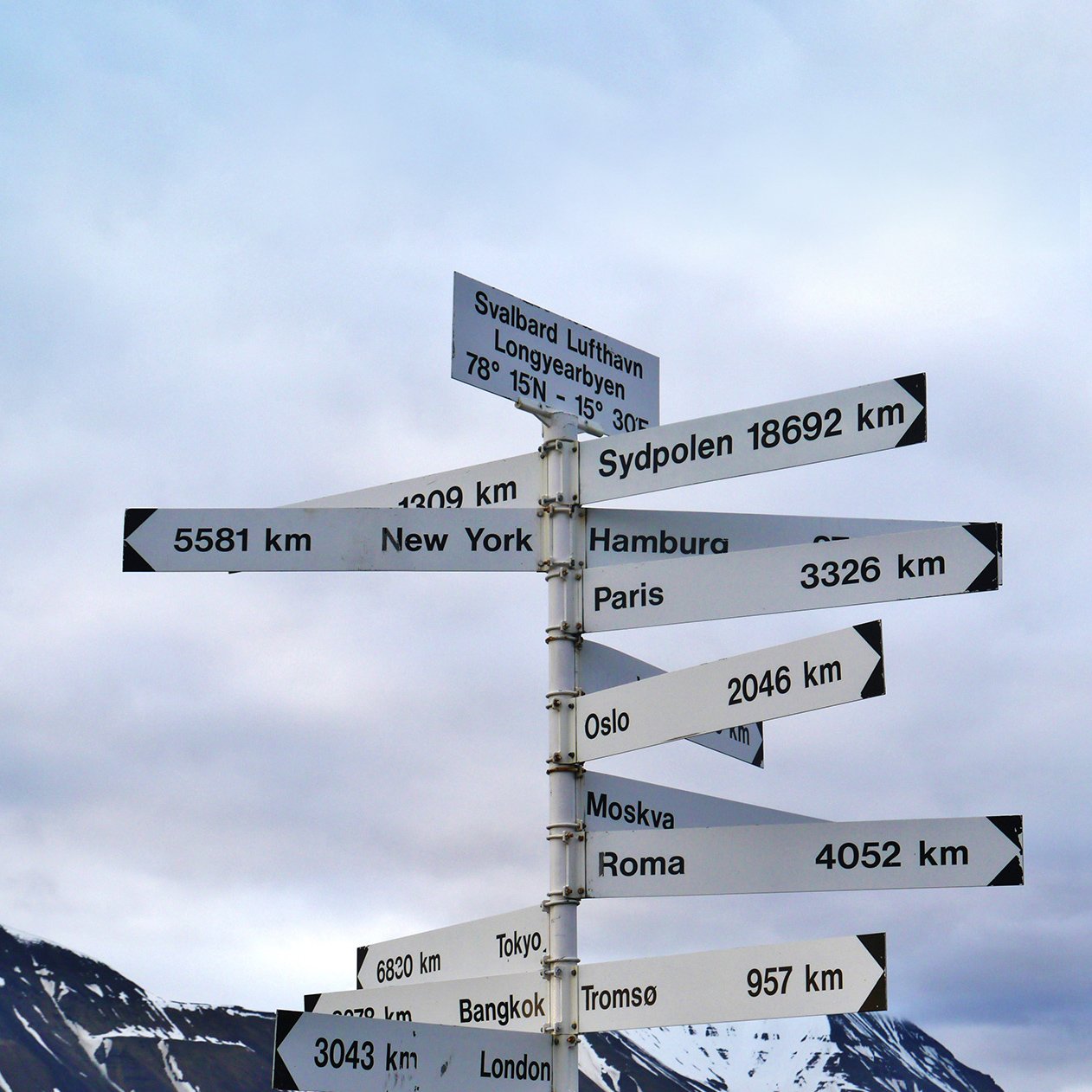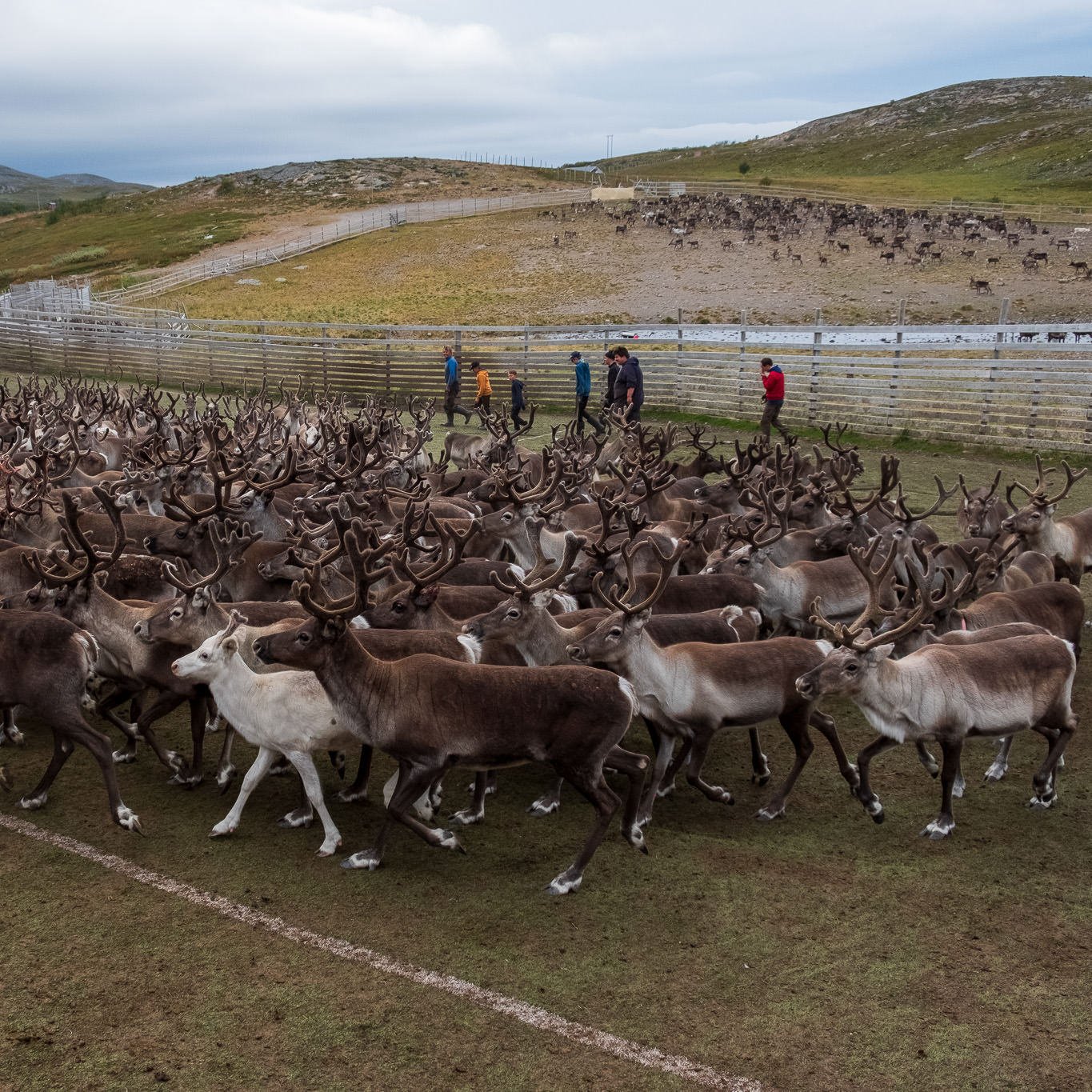A Shadow Over Svalbard
Once a haven for international cooperation, trust on the Norwegian archipelago is disappearing — and so are the rights of its residents.
MAY 7, 2024
When Torgeir Knag Fylkesnes arrived at The University Centre in Svalbard in September, he had heard only mutterings of desperation across the idyllic archipelago. Standing at the front of a classroom of around two dozen residents, the Norwegian Member of Parliament was confronted by much louder complaints. It was around 5 p.m. and the town of Longyearbyen was already pitch dark. Temperatures dipped below freezing. Inside, the atmosphere among the foreigners gathered was emotional — solemn, but hopeful. They expressed their fear that after years of peaceful coexistence in the Arctic, they were being pushed out. This is “the first time anyone in power has been willing to listen to us and hear what we have to say,” one participant recalled.
Svalbard is a collection of islands located approximately 800 miles south of the North Pole and over 1,200 miles north of Oslo, the capital of Norway, which has sovereignty over the archipelago. Longyearbyen, the largest of two permanently settled towns, is home to around 2,600 residents. More polar bears live in the region than people. In winter, the sun does not shine. This isolated, northernmost perennial community is not for those discomfited by distance: It attracts scientists, artists, and remote outdoor enthusiasts from all around the world who enjoy living in harsh conditions.
Though shrouded in literal darkness for four months a year, a different kind of pall has cast its shadow over the archipelago. The government in Oslo has restricted the civil rights of non-Norwegian residents on Svalbard. This group, who made up roughly a 35 percent of Longyearbyen’s population in 2023, is no longer eligible to vote in local elections and residents from certain countries no longer eligible to drive. As they fear that the Arctic has been changed by shifting geopolitics, they’re trying to fight back.
Longyearbyen, Svalbard. Photo by Bjørn Christian Tørrissen. 2022. (via Wikmedia)
Svalbard is decidedly paradoxical, existing in a realm somewhere between unarmed conflict and peace. The archipelago, also known by its original name Spitsbergen, was discovered by the Dutch explorer Willem Barentsz in 1596 and went largely unused and uninhabited for centuries. In the waning days of World War I, after the “war to end all wars” shattered generations and forever changed Europe’s borders, Spitzbergen became a refuge from conflict. Fifteen nations — among them the United States, Japan and Denmark — agreed to share the land for commercial, mining, industrial, and maritime activities and their citizens were given equal rights to live and work on the Arctic islands. Though overseen by Norway, the archipelago was exempt from many Norwegian laws, demilitarized, and a visa-free zone.
Nowhere else in the world could one simply arrive, away from the borders of one’s own nation, and begin anew without jumping through endless bureaucratic processes.
For more than a century, Svalbard was largely a zone of peace and cooperation, home to a wealth of Western scientific operations and the largest and northernmost commercial satellite relay. Residents could move to and work in Longyearbyen with little more than citizenship from their signatory country. Once transplants lived for three years on the archipelago, they had a voice in the community — they could vote in local elections, run for office, and contribute to decisions about local schools, energy and water costs, and more. The Longyearbyen Community Council, established in 2002, brought to the islands a more Norwegian approach to governance and control, but the archipelago was still a rarity. Nowhere else in the world could one simply arrive, away from the borders of one’s own nation, and begin anew without jumping through endless bureaucratic processes.
In 2007, all of that began to change. Russian divers planted a state flag on the seafloor of the North Pole making a symbolic claim to the area. Since then, signatory nations have started investing heavily in infrastructure and development on the archipelago. China has increased its research activity. In October, Turkey officially joined the Svalbard agreement and announced it would establish a research station to expand its exploration of natural resources and fishing activities in the waters around the archipelago.
Russia’s invasion of Ukraine has only raised tensions. In the spring of 2023, Russia announced that its mining company on Svalbard, Trust Arktikugol, would build a research station with help from China, Brazil, India, and South Africa. China and Russia also signed a cooperation agreement between their coast guards to “combat terrorism, illegal migration, fighting and smuggling drugs and weapons, as well as stopping illegal fishing,” the head of the FSB Border Service, Vladimir Kulishov said. In May of last year, Russian residents staged a paramilitary parade in Barentsburg, one of the few settlements on Svalbard, in support of the Kremlin’s war in Ukraine.
Norway views these moves by nations much larger and more powerful than it as existential threats to its and Svalbard’s security and prosperity, Norwegian security experts, former diplomats, and NATO military planners told me. These fears are not Norway’s alone. Across the circumpolar north many nations are increasing military spending, expanding fisheries and exploring oil and gas in the area for fear of losing out on valuable resources.
The policy went into effect that year; a quarter of Svalbard’s population, around 700 people, lost their right to vote.
Residents on Svalbard were initially bemused by the jockeying, largely because they have come to see the area for what the 1920 treaty stood for: an Arctic oasis shielded from geopolitical headwinds. When Sarah Gerats, a Dutch national and program manager came to Svalbard in April 2012, she said that it “was open and supportive, not practically, but no one really worried about foreigners.” But, she said, “that’s been changing.”
In response, Norway has begun to assert more control over the archipelago, enacting laws that restrict the rights of non-Norwegians. Unlike decisions made about the mainland, the executive and legislative branches of Oslo’s parliamentary government have the authority to revise laws on Svalbard without navigating the parliamentary chambers. In 2020, the Norwegian government expanded their oversight of housing used for public employees, and in turn displaced employees of private business (the exact figure is unclear). Two years later, the Minister of Justice and Emergency Preparedness Emile Mehl signed a law that took away the voting rights of non-Norwegians declaring that foreigners must live at least three years in mainland Norway before they can vote on the archipelago. The policy went into effect that year; a quarter of Svalbard’s population, around 700 people, lost their right to vote.
The first elections since the voting rights change were held in October 2023. There were 1,128 votes cast in 2019; only 808 were cast in 2023. The Liberal Party, Venstre, won along with its mayoral candidate Terje Aunevik. “Many consider Svalbard, and Longyearbyen, an international society, but that’s not the case,” said Aunevik. “It’s a Norwegian society That has never changed.” Aunevik, who supports the new changes, pointed to the establishment of the Longyearbyen Community Council in 2002: Had that been established with the understanding that only Norwegian citizens could participate, “we wouldn’t have had this discussion now.”
Since then, restrictions have only gotten tighter. In March, driving privileges for Svalbard residents possessing non-Norwegian licenses expired under a regulation created by the Norwegian Public Roads Administration. Luckily for residents who are citizens of nations party to the Geneva Convention on Road Traffic of 1949 or the Vienna Convention on Road Traffic of 1968, international agreements that facilitate cooperation in which Norway is a part of, the restrictions did not last long. After months of uncertainty, this group had their rights restored. That leaves out, however, a significant portion of foreigners from the Global South.
When I asked Svalbard Governor Lars Fause, whose role is outlined as having the same authority as a county governor in Norway, but residents and military personnel whom I spoke with say is largely ceremonial, about the change in the local election law and driver requirements, he deferred requests to Minister Mehl, and did not address the fact that many residents still could not vote.
“We are citizens of Longyearbyen. We live here. We want to live our lives here. We have no conflicts with people from whatever country it is.”
Over the course of my reporting, I spoke with over a dozen Norwegian analysts and security experts about the ongoing changes. Many noted that the central government in Oslo has begun to align more closely with the United States in northern security policy, which works alongside NATO countries and is wary of Russia and China’s Arctic activity. “Oslo is having to push back against challenges to the Spitsbergen Treaty from Russia and to a lesser degree China, while also trying to avoid the impression that it is seeking to go around the Treaty themselves,” said Dr. Marc Lanteigne, a Professor of Political Science at UiT, The Arctic University of Norway, and editor of the Arctic news blog Over the Circle. “Norway is acknowledging that Svalbard is becoming more of a security vulnerability.”
At the University Centre in Svalbard, Fylkesnes, the Norwegian MP, talked with non-Norwegian residents for two hours about their grievances. They were concerned that their driving licenses, once valid, would no longer be honored, making commutes and daily errands more difficult. They felt that changing voting laws were reflective of a government in Oslo responding to geopolitical headwinds and not the realities of their civil co-existence among many nationalities. In addition, they described wage disparities, spousal abuse without responses from local police, and a broader diminishing of democratic values.
“We as locals don’t perceive ourselves as geopolitical,” said Ronny Brunvollthe CEO of Visit Svalbard, a tourism organization. Brunvoll is originally from Harøya, an island off the Western coast of Norway, and moved to Svalbard because of his life-long interest in the Arctic. “We are citizens of Longyearbyen. We live here. We want to live our lives here. We have no conflicts with people from whatever country it is.”
In the summer of 2021, a group of residents founded The Spitsbergen Association of Unwanted Foreigners. What began as something of a joke, an intermingling of non-Norwegians and Norwegians, took on greater importance as the local government, pressured by politicians in Oslo, enacted these laws that made the once-inviting settlement less democratic. The group, which has grown to 466 members, meets irregularly with the local city council to discuss the growing strains placed on non-Nordic residents — and have recently arranged meetings with the new mayor to discuss options for formalizing the group. While the group is primarily concerned with the disappearing rights of non-Norwegians, they also discuss issues that pertain to all residents on Svalbard; a recent meeting, for example, focused on the rate hikes for utilities.
Fylkesnes was traveling far from his constituency in the north of Norway, but his visit was routine. The archipelago is key to the Socialist Left Party’s Arctic climate and energy agenda because the party has vowed to stop the current government from offering 78 new oil and gas exploration blocks in the Arctic, the highest number of licenses granted since licensing began in 2003. The MP was there to hear nominal concerns and bring them back to the mainland. What emerged from Fylkesnes’s trip troubled him.
“What opened my eyes the most was the feeling of unwantedness was so strong, and the stories they told of their children at school who were being bullied for being foreigners and the teachers were sharing this narrative of third-class citizens has never been part of the Svalbard culture,” Fylkesnes told me after the meeting. “It sort of felt authoritarian, the way the government has now altered the Svalbard society.”
A few weeks after the meeting, Fylkesnes wrote to Minister of Justice Emilie Mehl asking whether the deprivation of voting rights, and new regulations on who could be elected to the local council in Longyearbyen was legal. In response, Minister Mehl pointed to the Svalbard Act and, more broadly, the Spitsbergen Treaty as justification for the changes, noting that it was always within the rights of Norway to oversee the community in a way that benefited Norway first, and the nations who signed the treaty second.
The government, she said, took the position that the administration of Longyearbyen was fluid and needed to be reassessed as the community changed. Mehl told Flykesnes that she understood that residents were unhappy and largely concerned about their future on Svalbard, but believes that Longyearbyen should not be a lifelong community. (When I wrote to Mehl directly asking whether she felt the new laws followed in the spirit of Svalbard, a spokesperson in her office responded by pointing back to Norwegian laws establishing their oversight over Svalbard.)
In December of last year, three months after Fylkesnes’s visit and two months after the October election, some members of the Unwanted Foreigners group protested the change in voting rights by placing wooden footprints, signed by non-Norwegian residents who had lost their voting rights, outside a voting station during council elections. One of the plaques read: “There should have been a demonstration here. But it is too painful to see those who are allowed to vote.” The plaque was signed by: “The voiceless.”
✺
Elizabeth Bourne moved to Svalbard from Seattle nearly seven years ago, drawn by the light and community. Here, Bourne has been able to focus on her painting and artwork, where she is the director of the Spitsbergen Artist Center. Bourne told me in January that the archipelago is a special bolthole — where she can disappear into a like-minded community who turn to extreme latitudes for a reprieve from the rest of the world. “If I’m going to experience the reality, I have to live here,” she said.
Bourne is active in the Unwanted Foreigners group. Among the dozen that I spoke to, many said they feared creating divisions in the community. “We have lost so much,” Bourne recalled a friend saying recently. “We lost the vote, but Norway lost democracy.”
“The local council wants to find a way to allow those of us who can’t vote a voice in what happens in town, which is laudable,” Bourne told me after a January meeting held by members of the Unwanted Foreigners Group and the council. “After all, it’s not as if they wanted this either. Many were quite vocal about it being wrong. So I think it is worth it to try to work together.”
Still, Bourne plans to return to America permanently next year, and with that move perhaps the movement disappears, too. “It’s time. I can see how things are going for non-Norwegians and it’s going to get less and less pleasant.”
✺ Published in “Issue 16: Spies” of The Dial
PHOTO: Signposts at the Airport, Longyearbyen, Spitsbergen, Norway. by Zairon (via Wikimedia)




